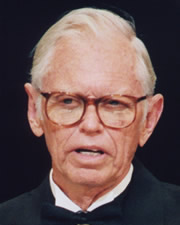W. Wesley Peterson
W. Wesley Peterson | |
|---|---|
 | |
| Born | April 22, 1924 Muskegon, Michigan, U.S. |
| Died | May 6, 2009 (aged 85) Honolulu, Hawaii, U.S. |
| Alma mater | University of Michigan |
| Awards | Japan Prize Claude E. Shannon Award |
| Scientific career | |
| Fields | Mathematics, computer science |
William Wesley Peterson (April 22, 1924 – May 6, 2009) was an American mathematician and computer scientist. He was best known for designing the cyclic redundancy check (CRC),[1] for which research he was awarded the Japan Prize in 1999.[2]
Peterson was born on April 22, 1924, in Muskegon, Michigan and earned his Ph.D. in 1954 from the University of Michigan.[2][3] Peterson was a professor of Information and Computer Sciences at the University of Hawaii at Manoa, joining the faculty in 1964.[4] He started work at IBM in 1954.[4] He authored the publication of algebraic coding theory Error Correcting Codes in 1961. He co-authored a number of books on the topic of error correcting codes, including the revised 2nd edition of Error Correcting Codes[5] (co-authored with Edward J. Weldon). In the early 1950s, he contributed significantly to the development of signal detection theory through participation in the IRE Professional Group on Information Theory.[6] He has also done research and published in the fields of programming languages,[7] systems programming, and networks. As well as the Japan Prize in 1999,[2][8] he was awarded the Claude E. Shannon Award in 1981,[4] and the IEEE Centennial Medal in 1984.[4] In 2007, two years before Peterson's death, Intel added crc32 to the SSE4.2 instruction set of the x86-64 architecture.[9]
Peterson finished 16th in the 2005 Honolulu Marathon for males ages 80 to 84.[10] He died on May 6, 2009, in Honolulu, Hawaii survived by five children from two different marriages, his wife, and several grandchildren.[3]
References
- ^ Peterson, W. W. & Brown, D. T. (January 1961). "Cyclic Codes for Error Detection". Proceedings of the IRE. 49: 228–235. doi:10.1109/JRPROC.1961.287814. S2CID 51666741. – The original paper on CRCs
- ^ a b c "Dr. W. Wesley Peterson, 1999 (15th) Japan Prize Laureate". Japan Prize Foundation. Retrieved November 24, 2011.
- ^ a b "Obituaries, Dr. William Wesley Peterson". The Honolulu Advertiser. May 17, 2009. Retrieved November 24, 2011.
- ^ a b c d The Newsletter of the Colleges of Arts & Sciences at the University of Hawaii at Manoa, Summer 1999, Volume 5, Number One Retrieved November 24, 2011
- ^ Peterson, W. W. & Weldon, E. J. (1971). Error Correcting Codes, Revised 2nd Edition. MIT Press. ISBN 0-262-16039-0.
- ^ Peterson, W.W., Birdsall, T. G. and Fox, W. C. (1954). "The theory of signal detectability". Proceedings of the IRE Professional Group on Information Theory. 4 (4): 171–212. doi:10.1109/TIT.1954.1057460.
{{cite journal}}: CS1 maint: multiple names: authors list (link) - ^ Peterson, W. W. (June 1974). Introduction to Programming Languages. Prentice Hall College Div. ISBN 978-0-13-493486-0.
- ^ Mary Adamski (December 16, 1998). "W. Wesley Peterson receives Japan Prize for work in digital error control". Honolulu Star-Bulletin. Retrieved November 24, 2011.
- ^ https://software.intel.com/sites/default/files/m/8/b/8/D9156103.pdf [bare URL PDF]
- ^ "Honolulu Marathon Updates – Results by division – Males 80 to 84". Honolulu Star-Bulletin. December 11, 2005. Retrieved November 24, 2011.
